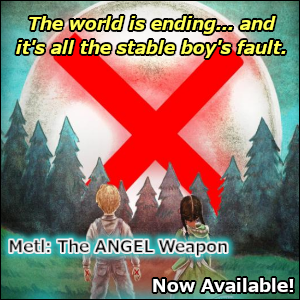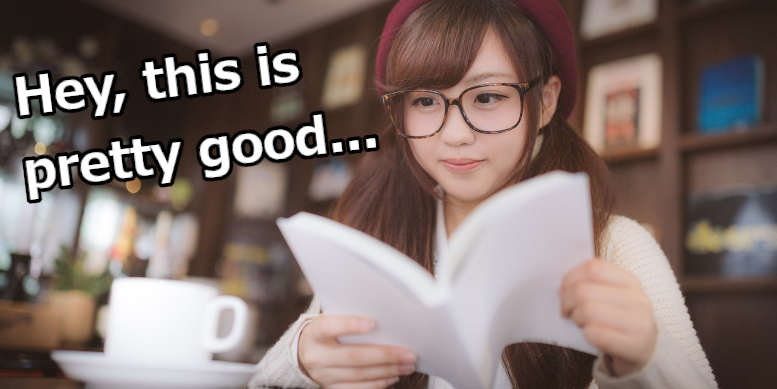It’s a simple question with a complex answer.
Let’s go over the 4 elements to a “good” story, look at some examples, and then argue/create our own together!
During the last stream, the subscribers voted that we go over what makes a story “good.”
Watch what we did here, or scroll down for highlights.
What Makes a Story “Good?”
- What makes a story good is a simple question, but the answer is far more complex
- Whether or not a story is “good” is largely subjective: it depends on the individual person, and different people will disagree on whether certain stories are “good” or not
- However, “good” stories tend to have certain objective elements: parts that can be identified and determined whether or not they’re present in the story
- It’s similar to food in a way: personal taste is subjective, but whether or not a food item has certain elements of taste like salty/sweet/bitter is objective
- So! Let’s take a look at some of those objective elements to “good” stories
- Again, your opinions on which elements are more important will vary, and that’s normal (just like food elements)
- And this is just my personal breakdown of the elements that make “good” stories, there are plenty of other ways to do it
- But for now let’s jump into the 4 elements of a “good” story: character, plot, setting and theme
CHARACTER (What makes a good character?)
- Relatability/empathy (personal connection, cheering them)
- Goals (something they’re striving for)
- Strengths/weaknesses (skills/flaws to make them human)
- Coolness (mysteriousness, relentlessness, physical design)
An example of a good character is Frodo from Lord of the Rings. He’s relatable/sympathetic because everyone has had to take on a daunting task before, he has a concrete goal to destroy the evil ring, he has strengths (bravery/friendship) and weaknesses (small stature/temptation), and he’s cool because he perseveres through incredible obstacles.
PLOT (What makes a good plot?)
- Conflict (something in the way of the character’s goal)
- Setup/payoff (events based on the premise that come into play later)
- Twists/turns (a few fun surprises along the way)
- Flow (scenes are not disjointed/jarring/confusing)
An example of a good plot is Misery by Stephen King. The conflict is an author kidnapped by a rabid fan, there are lots of setups/payoffs (especially the ending), several twists/turns (such as what the fan does to him), and it flows very understandably.
SETTING (What makes a good setting?)
- Authenticity (history, logical ripples ex: Quidditch)
- Cultural details (language, food, government, religion)
- Rules (magic systems, physics)
- Connectivity (relevance, could not take place elsewhere)
An example of a good setting is Temerant, the setting in Patrick Rothfuss’s The Name of the Wind. It feels authentic with its history that ripples into the current storyline, each location has its own culture and even cultures within them (university vs. town), the rules of magic/sympathy are very clear, and the setting of the city/university is integral to the story.
THEME (What makes a good theme?)
- Moral (what the reader learns/takes away from the story)
- Symbolism/motifs (story points standing for bigger ideas/story points repeating slightly differently)
- Connects to our world (the story reflects/interprets real life)
An example of a good theme is in Game of Thrones. There are many morals, such as justice does not always prevail, or real life is not like a story. There are lots of symbolism/motifs, such as the Stark children each relating to their Direwolves, and the story beginning/ending with a beheading. And there are lots of connections to our world, such as those in power ignoring the REAL threat while quibbling over their “game of thrones.”
What Can We Do With These 4 Elements?
- Which of the 4 elements matter to you can affect your enjoyment of certain stories
- For example, for me personally, plot/theme are very important. So if a story has great characters/setting but a bad plot/theme, I probably won’t end up liking it
- So let’s take a look at some examples of “good” stories that (in my opinion) have different combinations of the 4 elements
Remember! These are my opinions only. Yours will differ.
And all of these stories are GOOD just in different ways.
1 GOOD ELEMENT
- Character: Ren and Stimpy (nonsensical plots, random settings, anti-theme)
- Plot: Sixth Sense (generic characters/setting, unclear theme)
- Setting: Season 1 of Avatar: The Last Airbender (annoying characters, simplistic/confusing plots/themes)
- Theme: The Last Jedi (bland characters/setting, boring plot)
2 GOOD ELEMENTS
- Season 1 of Naruto (good characters/setting, weak plot/theme)
- The Golden Compass (good setting/themes, boring characters/confusing plot)
3 GOOD ELEMENTS
- Dry (everything good except characters who were stupid/annoying)
- Pachinko (everything good except plot, which doesn’t really go anywhere)
- Hunger Games (everything good except setting which is a little confusing/bland)
4 GOOD ELEMENTS
- The Matrix (favorite character: Mr. Smith, relatable!)
- 11/22/63 (favorite plot: twist of the time travel tunnel to the past is underneath a hamburger shack)
- One Piece (favorite setting: log poses to navigate Grand Line)
- The Phantom Tollbooth (favorite theme: learning is fun and worthwhile)
Who Cares?
- So what do we do with this information?
- It’s helpful for figuring out WHY we like certain stories, which is important for authors so we can incorporate what we like into our own stories
- Focus on what you like, and ALSO what you’re not paying as much attention to, then when crafting your own story you can do your best to make all 4 elements strong
Chat then voted that we use the four elements to write a story based on this prompt: The news is broadcasting your memories.
Here’s what we came up with:
Another rejection. Another Friday night at the O’MahGerd Pub.
I sat at the bar counter with Tim and Maisy, my enablers for the evening. We were surrounded by faded four-leaf clover and leprechaun cutouts from Party City plastered onto the walls. The only thing more depressing was the low, generic rock music playing overhead. And me, of course.
My rump was planted on the black leather seat atop the stool, and it was not going to move from that spot until I was ready to burst with alcohol.
“The usual?” the bartender Frank asked. I nodded. He just smiled and turned away to tend to the wall of bottles behind him. Seeing us three here, he must’ve known what was up.
“So what number is this?” Tim asked me. “Seventeen? Eighteen?”
“Ninteen,” I groaned. “If you count the twins as two.”
Maisy chuckled. “You’d think at least one of them would say yes to you asking them out by now. Just from the law of averages.”
“Not our Max, here!” Tim said, slapping me on the shoulder. “He jumps at the literal first chance to ask a girl out, before he even knows her name.”
“I just get nervous, all right!” I said. “Besides, might as well find out right away if she’s interested in me or not. No need to beat around the bush, you know?”
Maisy sighed. “You know, sometimes it’s good to get to know a person a bit before asking them out.”
I grumbled at that. She was right, of course, but the anxiety that coursed through me every time I was about to talk to someone I liked didn’t care. It just punched me in the gut and made me wheeze out the same desperate line every time. “Will you go out with me?” Followed by a swift “No.” Followed by a trip to O’MahGerd.
Waiting for my bottle of Jameson to drown my sorrows, I looked up at the TV. Typically it was just the local news, something that was only interesting after the fourth or fifth chug.
Except. Wait a minute. This time, it was showing something new. Something I recognized.
Because it was me. A video of me asking out Tiffany last month after Astronomy.
“I’m sorry,” she said, “but there’s just no attraction here. Gravitational or otherwise.”
Before I could even have my jaw hit the bar counter, the TV screen crackled to another scene. Another memory of me asking out another girl. Stacy from Economics.
“Sorry,” she said, “I feel no demand for your supply.”
Somehow, this TV was broadcasting my memories. And I hadn’t even had a single drink yet! I turned to Tim and Maisy, who were similarly watching, dumfounded.
The next memory flashed on. Me asking out Amanda during gym class.
“Sorry,” she said. “It just won’t work out.”
All I could do was gasp. “Holy crap! Are you seeing this?”
Oddly, Tim and Maisy smiled at me. Frank spread his hands on the counter and leaned close to my face.
“One question for you,” he said. “Who do you think recorded all those videos of you?”
I had no idea. I looked around, expecting a news crew or something, but there was no one.
“Maybe,” Tim said coyly, “it was someone who’s gotten to know you, and would actually like to be asked out by you.”
Now I was really confused. I looked to Maisy, hoping to find some answers, but she was just silently biting her bottom lip, eyes beaming at me.
Suddenly, I got it.
“Maisy?” I said. She looked at me with anticipation. “You’re in every single class I’ve taken. And you sit right behind me. You’re… in the perfect position to see who’s been recording me all this time!”
For some reason, everybody groaned.
Be sure to check out the video for more!
If you want to join us and help write a story by trolling in chat, or share your own writing for feedback, then we’d love to have you join us on Twitch.
And you missed the stream, you can still watch them on the YouTube channel or watch the full stream reruns.
Hope to see you next time, friend!
 Featured image: Pakutaso
Featured image: Pakutaso
